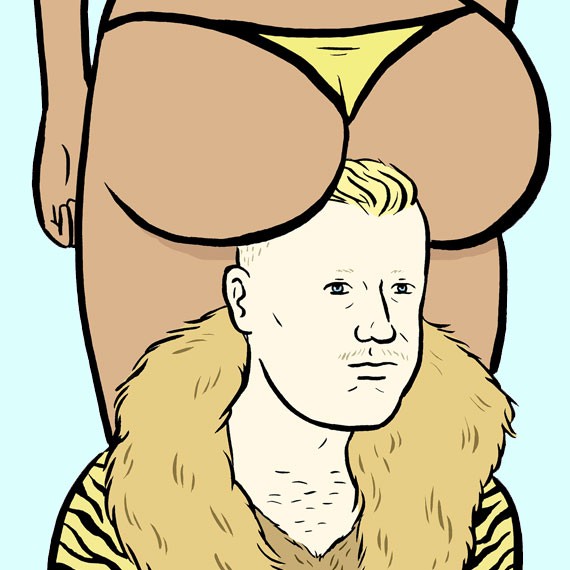Many years ago, KEXP DJ Riz Rollins pointed out to me the significance of Sir Mix-A-Lot's biggest hit, "Baby Got Back." At the time of its release in 1992, hiphop had two great camps: East Coast and West Coast. The East Coast was dominated by a pro-black, Afrocentric program with a militant side (Boogie Down Productions, Public Enemy, and so on) and a bohemian side (A Tribe Called Quest, Jungle Brothers, and so on). The West Coast was all about the gangster realism of Cypress Hill, Ice Cube, and Dr. Dre, whose track "Nuthin' but a 'G' Thang" became the anthem of that dangerous way of life. The music from both camps tended to be righteous, serious, and all about reality. Dr. Dre, for example, would spend hours in the studio trying to capture the exact sound that an automatic weapon makes when fired from a moving car; A Tribe Called Quest rapped about the importance of eating healthy foods and appreciating black cultural heritage. Then, out of nowhere, some rapper from Seattle released a track about loving big butts.
According to Rollins, Sir Mix-A-Lot's success caught everyone by surprise because (1) Seattle was completely off the hiphop radar, and (2) there was nothing in the mainstream that sounded remotely like his music. Sir Mix-A-Lot did not rap like Ice Cube or Chuck D, nor was he swept up by the Das EFX fast-rap "-iggedy" craze of that moment. Sir Mix-A-Lot rapped only like Sir Mix-A-Lot. As for the beat, with its weird mix of electro stabs and hectic robot bass, it was made by a producer who seemed to be completely ignorant of the mainstream trends—the G-funk of the West Coast and the deep jazz moods of the East Coast. Sir Mix-A-Lot's hiphop was like a weird plant (purple leaves, red stem) growing under the blended and bending light of two distant suns. But most importantly, Sir Mix-A-Lot wasn't so fucking serious. "Baby Got Back," which opens with a conversation between two white girls disgusted by a black woman's huge butt, returned laughter to the hiphop charts and the dance floor. The record felt like a window being opened in a stuffy room. Finally, someone wasn't rapping about being shot, or shooting a nigga, or returning to Africa, or being proud about the color of their skin. "This," Rollins explained to me, "was Seattle's big gift to black America. People remembered it was good to have fun now and then. And it could only happen in Seattle because we were so isolated. We were free to do whatever we wanted." "Baby Got Back" spent five weeks at the top of the Billboard chart.
Last week, Macklemore & Ryan Lewis's "Thrift Shop" became the top-selling single in the United States, the first rap record from Seattle to reach that position since "Baby Got Back." Though two decades separate these records, it is curious that they have so much in common. To begin with, "Thrift Shop" sounds like nothing else out there. Its beat is on its own, all alone in that homogenous realm of contemporary pop music. The warped horn, bouncy boom, buildup of the bridge—all of this sounds as if it were made in a world that had no idea hiphop centers like Atlanta, NYC, or LA existed. As Sir Mix-A-Lot raps only like Sir Mix-A-Lot, Macklemore raps only like Macklemore. Indeed, many of the commenters on his YouTube videos compare him to Tupac, not because they sound similar, but because they share a style that feels honest and direct. Finally, "Thrift Shop" also returned laughter to the dance floor and the pop charts. In a rap world that's still obsessed with gold, executive automobiles, and getting those Benjamins, Macklemore raps: "Draped in a leopard mink, girls standin' next to me/Probably shoulda' washed this, smells like R. Kelly's sheets (piiisssssss)." In fact, during the week that Macklemore & Ryan Lewis are ruling the top 10 singles, the only other track that has a sense of fun and play is by a man rapping in Korean.
Because Seattle is so disconnected from the mainstream in this small corner of the huge United States, we could never produce the kind of predictable rappers who are obsessed with gold everything (Atlanta's Trinidad James) or have a serious boner for fucking problems (NYC's A$AP Rocky). Our rappers are instead asking girls to buy them drinks (Don't Talk to the Cops!), or having Christmas on the moon (THEESatisfaction), or celebrating the greatness of a Filipino deli on Beacon Hill (Blue Scholars), or feeling like $1,000 in 1988 (Fresh Espresso), or dealing with an old beat-up Volvo (Grynch). "Thrift Shop" will sound like something that came straight out of the blue if you don't come from "The Town." ![]()
This article has been updated since its original publication.




















